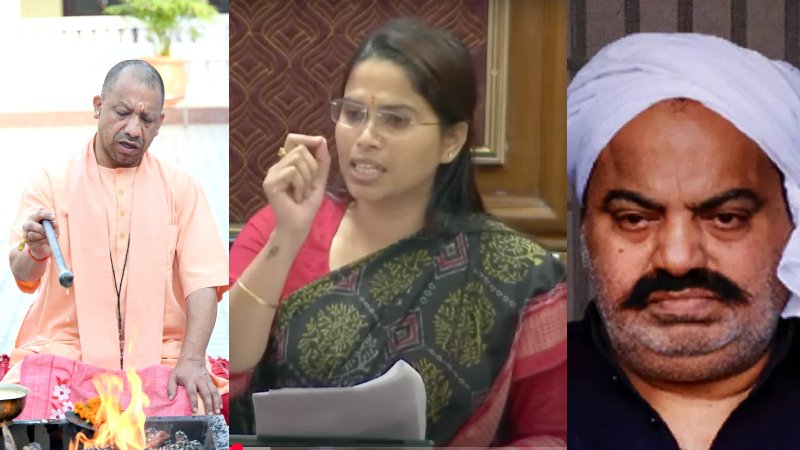On Monday, Uttar Pradesh Chief Minister Yogi Adityanath inaugurated the three-day International Forensic Science Seminar at the Uttar Pradesh State Institute of Forensic Science (UPSIFS), Lucknow. The summit coincides with the third foundation day of UPSIFS and has brought together more than 100 forensic experts, academicians, and law enforcement officials from India and abroad.
CM Yogi Adityanath, in his address, highlighted the importance and necessity of the seminar. He connected its importance with the knowledge of ancient India. He said, “Forensic science is necessary for today’s world. It helps us protect against cyber threats. It also supports national security. By using modern science and technology, we can deal with these challenges. The discussions in this seminar will guide us. They will help society face present and future challenges in a better way.”
The Chief Minister has also inaugurated the newly established Drone and DNA laboratories and flagged off forensic vans for 75 districts,” Goswamy added.
Strengthening Forensic Infrastructure
Over the past eight years, the Yogi Adityanath government has made substantial progress in building forensic infrastructure in the state. This expansion has intensified the fight against crime, increased public trust in the justice system, and opened new career opportunities for young professionals.
By integrating advanced technologies, enhancing lab capacity, and training youth in forensic sciences, the government is paving the way for a safer and technologically advanced Uttar Pradesh.
During his address, CM Yogi Adityanath mentioned that “collecting samples and bringing reports used to take decades and till then, the perpetrators did not face punishment. Sometimes they did not face punishment at all. However, our zero-tolerance policy towards crime needs to be upgraded in the forensic infrastructure.”
Before 2017, Uttar Pradesh had only four forensic laboratories located in Lucknow, Varanasi, Agra, and Ghaziabad. Today, the state has 12 active labs, with new facilities set up in Jhansi, Prayagraj, Gorakhpur, Kanpur, Bareilly, Gonda, Aligarh, and Moradabad.
Work is also underway to establish six additional labs in Ayodhya, Basti, Banda, Azamgarh, Mirzapur, and Saharanpur. Once operational, these centres will further strengthen evidence collection and criminal investigations.
UPSIFS: A Premier Centre for Training and Research
The establishment of the Uttar Pradesh State Institute of Forensic Science (UPSIFS) has been a turning point for the state. The institute has quickly become a premier centre for education, training, and research in forensic science.
Police officers, trainee scientists, and students are receiving training in cutting-edge forensic techniques. The institute is also conducting advanced research, which is expected to position Uttar Pradesh as a national and international hub for forensic excellence.
Officials stressed that forensic evidence is now playing a critical role in securing convictions, especially in complex cases such as cybercrime.
Uttar Pradesh Leads in Fingerprint Digitisation
Uttar Pradesh has also modernised its fingerprint identification systems under the National Automated Fingerprint Identification System (NAFIS).
Hardware and software have been installed at 98 locations across the state, linking nine STF units, one ATS unit, and 12 GRP units. More than 4.14 lakh fingerprints have been digitised so far. This has helped police quickly identify criminals, trace repeat offenders, and match unidentified bodies.
Because of this achievement, Uttar Pradesh secured the first rank in NCRB’s national dashboard for fingerprint digitisation.
New Steps in Cybercrime Prevention
The Yogi government has placed special focus on cybercrime, which has become one of the fastest-growing challenges for law enforcement agencies worldwide.
In 2023, the state established 57 new Cyber Crime Police Stations, significantly expanding the capacity to deal with online fraud, financial scams, and cyber-enabled crimes. With the support of forensic experts, cybercrime cases are now being handled with greater speed and precision, leading to stronger convictions.
Linking Law, Technology, and Justice
Officials said the new criminal laws – Bharatiya Nyaya Sanhita (BNS), Bharatiya Nagarik Suraksha Sanhita (BNSS), and Bharatiya Sakshya Adhiniyam (BSA) – have created fresh opportunities for the use of forensic science in investigations.
Specially trained forensic scientists are being deployed across units to ensure stronger evidence collection and faster delivery of justice. Their role has become especially important in cybercrime, terrorism-related cases, and cases involving unidentified bodies.
Towards a Safer and Stronger Uttar Pradesh
The International Forensic Science Summit marks another milestone in the state’s journey towards building a modern and scientific policing framework. With experts from around the world sharing knowledge, and with the government continuing to invest in infrastructure, Uttar Pradesh is positioning itself as a model for other states in India.
By expanding forensic science facilities, digitising criminal records, setting up cybercrime police stations, and training youth in advanced scientific methods, the Yogi government has ensured that criminals face stronger punishments and citizens enjoy greater security.
As one official summed it up: “Forensic science is no longer just about solving crimes. In Uttar Pradesh, it has become a weapon against cyber criminals, a tool for justice, and an opportunity for the youth to build promising careers.”


